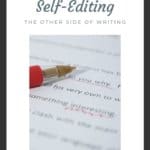Audio Playback Powered by Amazon Web Services |
Self-editing is a process of reviewing and correcting your own writing. And it's an essential piece of your workflow if you want to get paid to write, write your nonfiction book, or make money as a freelance writer. Why, then, do so many people seem to hate self-editing?
I think the answer is in the shift required to get into editing mode.
Writers and authors are creatives, above all else. Even if you're writing nonfiction, you're relying on the parts of your brain that run on inspiration, creativity, and expression.
As far as I'm concerned, one of the best parts of the writing process is coming up with the spark. That one idea that is going to ignite into pages and pages of prose.
This is one of the major reasons I got into ghostwriting. Once that idea hits me — once I get that spark — it's like the stall gates of a horse race burst open and I'm off. Pens, legal pads, notebooks, tablets, computer. Do I have a free thumb drive? None of these available to me – no problem! I can take notes on my phone.
As quickly as possible, I get the idea jotted down and the equipment and materials gathered so I can get started on it. And that spark drives a period of motivation like you would not believe. I can get a few thousand words down in a couple of hours. I had the first 29,000 words to Heir of Elendri in three days.
It's awesome.
When I'm really worked up, this motivation can bring me straight through to the end without a pause. Sometimes I'll come across a bit of a block that will slow me down; but another spark and I'm golden.

But, no matter how motivated I am to write, getting motivated to self-edit requires a whole different process.
Self-editing requires a huge change in thought processes. And it takes a bit of preparation to get ready for that.
You're no longer relying on creativity and inspiration, but rather you have to switch over to precision and systematically seeking out not just mistakes but areas for improvement.
This is one of the reasons why editing while you write will slow you down. It's not because of the three or four minutes it took you to change that sentence, but because of the amount of time it takes your brain to switch lanes from creating to editing.
And it's one of the reasons why we say to take a break between finishing your draft and self-editing — to give your brain a chance to make that shift.
My Best Tips for Self-Editing
Well, we all have our own methods for self-editing; but I'll tell you about mine.
First, I try to remember what the novel was about – what the big picture was. Typing out this sentence, it looks really weird… But trust me. I know me, and I can be very tangential. It's really easy for me to get sidetracked and start following a subplot and, in doing so, leaving a gaping hole in my main plot that I could fall into.
How in the world did that guy get from point A to point B? And where did she come from? It happens – more often than I'm proud to admit.
So, I grab my legal pad and a pen, and I start reading my novel. What I'm looking for is just the plot. Do I actually explain how that guy got from point A to point B, does it make sense, and will I be leaving my readers to trip over a huge hole to get there? I'm also looking that everything moves the story along – if it's in my novel, it should be telling that story. If I come across a subplot that isn't necessary, I move it to a whole new file – maybe I can use it in a different story? Or maybe I have to do more to make it fit into this one. Either way, by the time I've finished with this step, I know that the story goes from beginning to end with no major derailments in the middle. This also helps refresh the story in my mind.
Now, remember that legal pad and pen I grabbed? Here are the various notes I jot down while I'm reading through any novel I've written or ghostwritten:
- Timeline – even if the novel is not written in exact chronological order, I want to make sure that when I say something happened “two years later” it still works.
- Major plot points – I make sure they are all on the timeline as well.
- Characters – nothing annoys me more than when I write a character to do one thing, then go back later on and have that same character completely contradict himself. Jot down major quotes, characteristics, and behaviors that I can use to keep continuity later in my process.
- Stupid mistakes – I mean the really dumb ones that only come from talking to people who speak incorrectly; things like interchanging the words Lay or Lie, Affect or Effect. The first time I spot a mistake that I know is so silly it'll be everywhere, I jot it down so that I can look for that mistake specifically later on (else I will miss them).
- Created words – typically, if I create a new word or a name or city that is unique to my story, or use a unique spelling to a name, then one of the first things that I will do is to add that new word into my word processor's dictionary. This way, I'm hoping that the spellchecker will help catch any of the times that I may misspell my own word. I use the legal pad to jot them down so I can try to catch any that the spell checker missed, and so I can use the same words / names in any sequel that might come about.
- Rules to my world – whether I'm writing fantasy, historical fiction, or sci-fi there are rules. While it's true that in my world I can create the rules, once I've created them I can't very well break them all the time. It's kind of like how physics works in 2014 on Earth – it works for everything straight across the board. And on rare occasion, when something appears to break the laws of physics, it creates mystery and intrigue. But this is rare. If I am going to break the rules in my world, it has to be in the same manner; it has to be rare, and it has to create something that will drive the story along.
- City and country names – Similar to my character names, I need to keep my cities straight. How big are they, what was the size of the city they came from, what is the political ideology of the country they're in… Did I even use the same city name? I'm serious; during my first read through for Heir of Elendri, I discovered that Celyna had left the city of Elendri to travel to the town of Blyest, only to then arrive in the city of Mitania.
Oh yes, I make lots of lists and notes during this phase.
I've been told that this is overkill, but I say it's necessary because I really will forget.
Now I do several more read-throughs. I know a lot of other writers out there say not to do this. They're afraid that the more you read your novel, the more you'll pick it apart and criticize it. And that might be. But at this point, I've made a list of specific things that I am looking for, and that's what I do. I look for these potential continuity disasters. Some of these things are such small details that trying to find them all in just the one read-through would be impossible for me. Breaking them up in this way helps to ensure that I really will catch them.
The next thing I do while self-editing is place my story on ice for a little while. I go work on something else (believe me, there are plenty of things I need to get done). I do this so that I can come back with fresher eyes for the next read-throughs that will be coming. And they're coming.
This is where my degree in psychotherapy really helps. My next read-throughs follow my characters, especially with all the other changes to keep the plot and story congruent. Motivations, personality traits, behavioral patterns. Would he even do that?
Finally, when my setting is clear, my plot is bulletproof, and my characters are doing what they should be doing, now I dig into the nitty gritty. Did I use the correct words their or use there cousins two often? Did I use too many colloquialisms, or do they work for this story? Are my tenses clear? How is the flow? Are there any times when people might get confused on who I'm talking about when I use “he” or “she”?
The next step I don't do, I have someone else do it.
That is, I try to get someone else to read the entire manuscript and just jot down any times in which he was confused or needed further explanation. Since I'm not looking for an actual critique here, the only real criteria this person has to meet to be asked is that he likes to read the particular genre of the novel. He doesn't need to be a writing or grammar aficionado… Just literate.
Then I go into sniper mode.
Once I know what I'm looking for, it's much easier to go back into that story and take a scalpel to it. Cutting unnecessary tangents, fixing character arcs, and tweaking dialogue. And because I am going in there with my handy-dandy list of tumors, I can get it done with relative ease. Command+F (or Control+F for you Windows users) and I can find just about any phrase that I wrote down that I hated. I can find where I spelled my own words incorrectly, and I can see just how many times I repeated myself. This makes my editing process, overall, a little easier to handle.
Did you enjoy this article? Here are some more posts on editing you may like:





By the time I get to the fifth or sixth revision of a book, I’m sick of the story and I don’t feel like I know what I’m doing anymore. I have all these fiction- writing rules in my head, and they dog me every step of the way. I enjoy the initial writing process, but revising and editing exhaust me. If only I could produce a first draft that wasn’t such a mess!
Thanks for the post, Naomi. Pinned & shared.
Thanks Linda!! And I know what you mean, by my 5th or 6th read-through, I’m convinced that my story is flat and boring. That’s actually one of the reasons I have someone else read through it after all that — so when he gives me his opinion or tells me where he got lost, he can help remind me what it looks like to new eyes. 🙂 And thanks for the shares!! I really appreciate that!